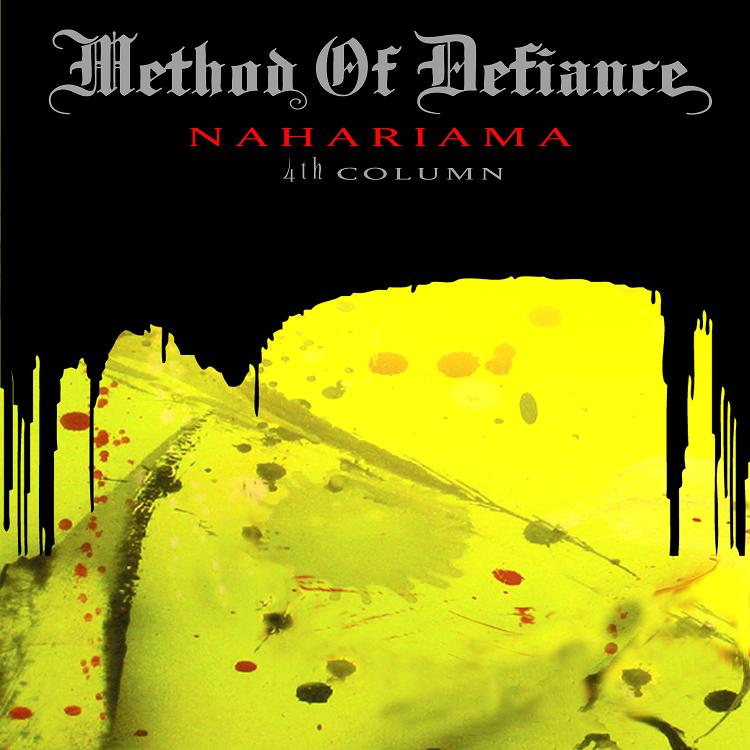METHOD OF DEFIANCE


1/ Code Woo Redux (Worrell) 0.17
2/ Anachronizer Reloded (Laswell,Krush) 4.58
3/ Dark Rain (Laswell) 6.47
4/ Anathema (Laswell,Haynes) 3.32
5/ Unearthed (Laswell) 6.47
6/ Fukashima (Laswell) 7.37
7/ Abyssos (Menace) 6.54
8/ Quantum Clash (Laswell,Haynes) 5.09
Recorded and mixed at Orange Music, Orange, New Jersey
Engineered by Robert Musso
Second: James Dellatacoma
Produced by Method of Defiance
Executive Producer: Giacomo Bruzzo
First Layer Art: Rammellzee
Package design by Randesign: Yoko Yamabe
Method of Defiance Logo: John Brown @ Cloud Chamber
MOD Support: Dave Brunelle
Mastered by Michael Fossenkemper
Bill Laswell: bass; DJ Krush: turntables; Bernie Worrell: keyboards; Toshinori Kondo: trumpet;
Graham Haynes: cornet; Robert Burger: keyboards; Guy Licata: drums; Aiyb Dieng: percussion.
2013 - due May 28, M.O.D. Technologies (USA), MODLP0010 (Vinyl)
2013 - due May 28, M.O.D. Technologies (USA), MOD0010 (CD)
In these beginnings flutters a list, inscribed as if on papyrus. It is a roster of and for the ages: Bill Laswell on bass, DJ Krush, Bernie Worrell and Robert Burger on keyboards, Toshinori Kondo on trumpet, Graham Haynes (son of drummer Roy) on cornet, Guy Licata (purveyor of real-time drum ‘n’ bass) on drums, and master Senegalese percussionist Aiyb Dieng. Names and vocations are penned in accordance to their stations, solidifying the place of each in a universal unfolding of sonority. The rhythms thereof draw sweat even from heatwaves, gifting the knowledge of history made present as if it were a drop of night powering a thousand bodies.
The dub vibrations of “Unearthed” sail a river of lava, guided by the oar calls of a melodica. It’s all in the details of the vision: the sacred crotales, the snaking bass-speak, the keyboard riffs and reveries. All of these combine in one stable vessel, opening pores to the nourishment of uncertainty. The sun must set even as it rises, leaving the shed skin of some nominal mission to choke in moonlight. The volcano continues to complain, and the musicians can only hope you will hear it even when closing your eyes to what the day has brought back to life.
In the wake of this slumber, “Anathema” comes as a fluid shock to the senses, to which Kondo’s trumpet is a ghost summoning its own body before cremation. It turns sediment into wine of experience, inviting the shaman for a sip before the slip. In this act of transference, it’s as if the very sky were being wounded, leaking the cloudy plasma of “Dark Rain,” in which organ-breath and dub-tears fuse in a spiral of mutual interest. The mirage is as real as the groove pouring from its open veins, a conduit between flesh and earth that ignores the sky as the illusion it has always been.
Within the context of these downright mystical cymatics, it’s all the more sobering to be reminded of human folly by the remnants of “Fukushima.” Here the listening, being spun from molecular awareness, is as thick as a shroud of mourning. Laswell is the primary voice, a serpent whose skin wears the aftermath like a scar in ways the dead cannot. It has no wall of terminology to scale, no labyrinth of choice to solve. It has only internal radar and a desire to recalibrate its disturbances.
Hence, the resurrection of “Abyssos,” which shakes off the sadness like water from canine pelt and moves toward a healing world. Knowing that emptiness has always been its greatest threat, it smiles as the galaxy opens wide for a swallow of hope. Licata’s drumming keeps the iconography three dimensional, if only that we might better understand its ambient dispersion.
This leaves “Quantum Clash” to unleash the fullest groove of these all. Drilling into the ground for want of home, it proceeds at full tilt, keyboards and bass allowing the surrounding frictions plenty of singing room. This is catharsis as anti-catharsis, winking at its own reflection to demonstrate the whimsy of infinity.
It’s no giant leap, then, to surmise that album’s title comes from The Book of the Sacred Magic of Abramelin the Mage, a Kabbalistic grimoire dating back to the 15th century. The word nahariama means “river of waters,” and describes the concepts of art occurring herein with far more veracity than the hundreds of other words in which I have cushioned it. Either way, its currents will flow, with or without us. Of that you can be sure.
Tyran Grillo (courtesy of the ECM Reviews website)